Petzyo Top Breed Guide
French bulldog

QUICK FACTS
Height: 28 - 30 cm
Weight: 7–13 kg
Lifespan: 12–14 years
Coat Type: Short and smooth
Color Variations: Fawn, brindle, white, cream, pied, blue, lilac
Energy Level: Moderate – short play bursts, frequent naps
Grooming Needs: Low – occasional brushing, regular wrinkle cleaning
- Breed Overview
- Physical & Appearance
- Personality
- Health & Diet
- Grooming & Care
- Cost & Ownership
Origins of French Bulldogs
French Bulldogs, affectionately known as “Frenchies,” were originally bred as companion dogs for English lace workers in the 19th century. These workers bred small Bulldogs to serve as lap dogs in Nottingham. When many of these workers relocated to France during the Industrial Revolution, they took their tiny companions with them—and the breed flourished there. Eventually, selective breeding in France refined their now-iconic look: compact, muscular, flat-faced, with ears that stand tall and alert.
Unlike traditional bulldogs, French Bulldogs were never bred for fighting or labour. They were bred purely for companionship—to be by your side, on your lap, and part of your family.

What Makes French Bulldogs Truly Unique?

French Bulldogs are unlike any other breed. They’re emotionally expressive, irresistibly playful, and incredibly adaptable.
What sets them apart is their ability to form deep emotional bonds with their humans, without needing constant activity or stimulation. They give generously in love, loyalty, and companionship, yet ask for very little in return.
Unlike many high-energy breeds, Frenchies are content with short play sessions, cuddles on the couch, and simply being by your side. They strike a rare balance between affection and independence—they adore attention but don’t demand it 24/7. As a low-energy dog, the Frenchie is content with a few short play sessions and lots of lounging beside its humans.
BREED SUMMARY
French Bulldogs bring joy, personality, and loyalty into every home they enter. They’re not perfect—they snore, they can be stubborn, and they demand your presence. But in return, you get a deeply affectionate companion who becomes more than a pet—they become family.
Their beautiful personalities, small size, calm temperament, and minimal space needs make them a wonderful family member. Whether you live in a small apartment or a busy household, they adjust with ease and thrive in close contact with their people.
But make no mistake—French Bulldogs are not a low-maintenance breed. Their unique health, grooming, and emotional needs require daily attention. They flourish with owners who can provide consistency, presence, and care. Before bringing one home, take an honest look at your lifestyle, time, and budget—because owning a Frenchie is a long-term, daily commitment.
Supporting their wellbeing starts with proper nutrition. A species-appropriate, BARF diet supports their digestion, energy, skin health, and immune system—especially important for a breed prone to sensitive stomachs and allergies. That’s why we offer premium dog food, crafted specifically for French Bulldogs, using real meat and gut-friendly ingredients.
When you feed smart, train patiently, and love consistently—your Frenchie will reward you with laughter, loyalty, and years of unforgettable companionship.
When you feed smart, train patiently, and love consistently—your Frenchie will reward you with laughter, loyalty, and years of unforgettable companionship.
FAQs About French Bulldog
Is a French Bulldog Right for You?
Yes, if you are home often, enjoy close companionship, and can handle breed-specific care needs. No, if you’re away for long hours or want a high-energy outdoor dog.
Are French Bulldogs Hypoallergenic?
No. French Bulldogs shed and produce dander and saliva, which can trigger allergies.
Do French Bulldogs Bark a Lot?
No. French Bulldogs are generally quiet and only bark when seeking attention or alerting.
Can French Bulldogs Travel on Planes?
French Bulldogs are not suited for air cargo travel due to breathing risks. In-cabin travel with vet clearance is safer.
Are French Bulldogs Born with Tails?
Yes. French Bulldogs are born with short, screw-shaped tails, not docked. Tail structure is breed-specific.
Is Pet Insurance Worth It for French Bulldogs?
Absolutely. Pet insurance helps cover costs for common breed-related health conditions and emergencies.
Coat type
Coat length
Physical & Appearance
French Bulldogs are small, muscular dogs with a compact frame, flat face, and large, upright ears. They have short, smooth coats and a distinctive silhouette that sets them apart from other breeds.
In Australia, French Bulldogs are known for their wide variety of coat colours and unique markings. Dogs Australia (formerly ANKC) officially recognises some colours as breeding standards for showing and breeding. Other colours—often called designer or rare—are popular with pet buyers but are not accepted in conformation shows.
Standard Colours & Markings
(Recognised by Dogs Australia)
According to Dogs Australia, these are the acceptable coat colours and patterns for pedigree French Bulldogs in Australia. These colours are also used in conformation shows and are typically bred with health and structure in mind.

Fawn
Ranges from pale tan to red fawn
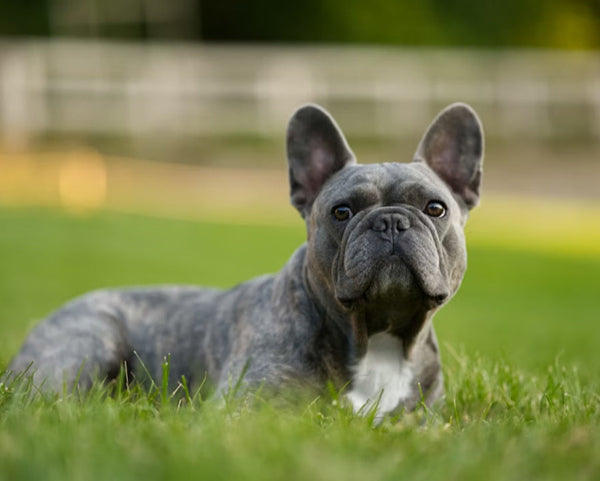
Brindle
Dark coat with light streaks
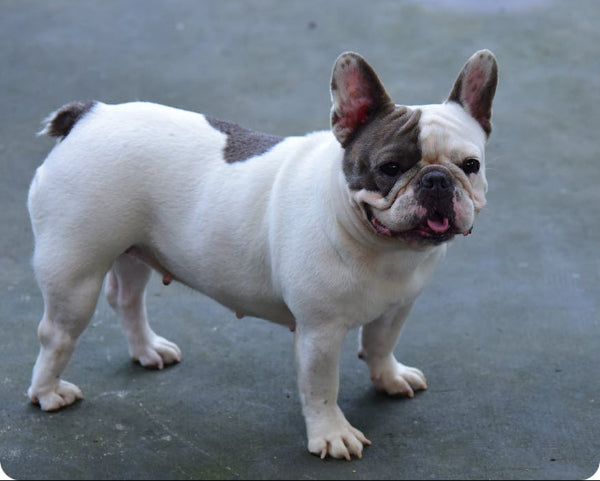
Pied
White base with fawn or brindle patches

Cream
Solid pale yellow or off-white

Black mask

Brindle points

White patches on fawn or brindle coats
French Bulldogs vs
English Bulldogs
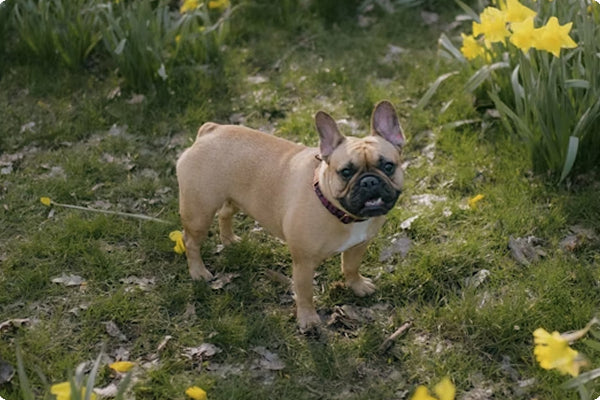
French Bulldogs are smaller, lighter, and more active than English Bulldogs. They weigh 7.3–12.7 kilograms, while English Bulldogs often weigh over 22.7 kilograms.
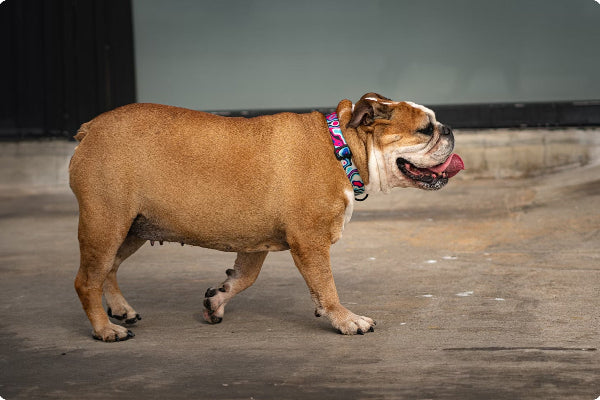
English Bulldogs are quieter, slower, and more stoic in temperament. French Bulldogs are more vocal, agile, and interactive.
Rare or Non-Standard Colours
(Designer Frenchies)
Dogs Australia does NOT recognise the following rare French Bulldog colours and disqualifies dogs from being shown or registered as pedigree. However, they are highly sought-after in the pet market and can significantly increase the purchase price.

Blue
Diluted black with grey tone

Isabella
Silvery beige from diluted chocolate genes
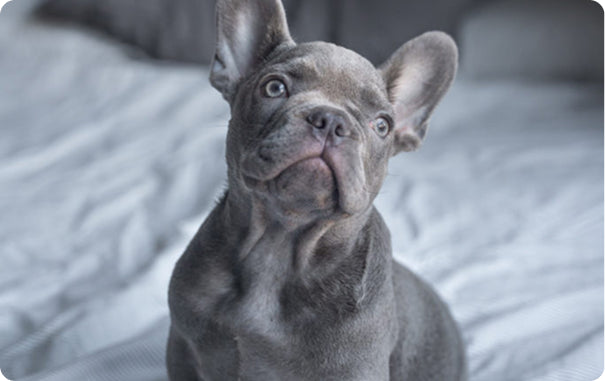
Lilac
Pale purple-grey from blue and chocolate dilution

Merle
Mottled patches in various colours

Chocolate
Rich brown, not breed-standard

Solid Black
Full black without markings
Are Color Variations Linked to Health Concerns?
Yes. Rare coat colors are linked to increased health risks due to recessive genes. Common issues include:
- Skin conditions such as colour dilution alopecia (CDA)
- Deafness and vision issues (especially in merle dogs)
- Weakened immune systems from poor breeding practices
- Higher risk of genetic disorders when health testing is skipped in favour of colour breeding
💡Buyer Tip: If you’re considering a rare colour Frenchie, choose a breeder who performs full DNA health screening and is transparent about the dog’s lineage—even if the dog isn’t ANKC-recognised.
How Coat Colour Affects Price and Demand?
Color dramatically impacts price, demand, and long-term care costs in the French Bulldog world.
- Standard colour Frenchies from ethical breeders typically range from AUD $4,000–$6,500
- Rare colour Frenchies (like lilac, isabella, or merle) can cost anywhere from AUD $8,000 to $15,000+
The rarer the gene, the higher the demand and price. But remember—rare doesn’t mean better. In fact, the demand for exotic colours has led to unethical breeding practices in some circles.
Affectionate with family
Good with kids
Social doggos
Playfulness
French Bulldog Temperament & Personality

French Bulldogs are affectionate, playful, and socially aware dogs. They are adored around the world not just for their adorable looks but for their unforgettable temperament. They’re the full package: playful yet easygoing, affectionate but a little stubborn, charming with just the right dash of sass. Their personality is a huge part of why they’ve become one of the most popular companion breeds in Australia—and across the globe.
French Bulldogs are ideal companion dogs for apartments, families, or singles. As one of the best dog breeds for apartment living, they thrive in small spaces, adapt to various routines, and form deep emotional bonds without needing constant outdoor time.
Are French Bulldogs Smart?
Let’s settle the debate: Are French Bulldogs smart? Yes—but not in the traditional “fetch-my-slippers” way. French Bulldogs are emotionally intelligent and highly intuitive. They are masters of reading body language and tone. They know when you're happy, stressed, or about to leave the house—and they’ll react accordingly.
French Bulldogs are not eager to please, but they are clever. They might not top the charts in obedience competitions, but that’s more due to their stubborn streak than their brainpower. In fact, many Frenchies are too smart for their own good—they’ll figure out how to manipulate you into giving that extra treat or skipping a training session.
Are French Bulldogs Aggressive?
No. French Bulldogs are not naturally aggressive. They are gentle, sociable, and the most people-oriented breeds out there.
Aggressive tendencies, when they occur, are usually a result of:
- Poor socialization as a puppy
- Fear-based reactivity
- Pain or discomfort (especially from untreated health issues)
- Protective instincts gone unchecked
With proper training, early exposure to people and other animals, and a consistent routine, Frenchies are among the friendliest and well-mannered dogs you can own.
Behavior Challenges in French Bulldogs
French Bulldogs may be irresistibly cute, but they’re not always easy to handle. They can develop separation anxiety, stubborn habits, or destructive behaviors without proper care. These issues stem from emotional attachment, boredom, or lack of routine.
Separation Anxiety & Clingy Behaviour
French Bulldogs are true companion dogs and prone to separation anxiety. They thrive on human connection and can become anxious or distressed. When left alone for long periods they may show:
- Whining or barking when alone
- Chewing, scratching, or destroying furniture
- Accidents despite being toilet-trained
French Bulldogs express stress through behavior. This is not defiance—it’s a need for emotional reassurance.
Stubbornness & Training Challenges
French Bulldogs are smart, but they like to do things their way. They often resist commands and prefer selective listening. Common signs include:
- Ignoring verbal cues
- Delays in house training
- Focusing only when rewards are involved
But here’s the truth: with patience, consistency, and the right motivation (usually food or praise), they’ll learn anything.
Avoid punishment. Frenchies shut down emotionally with harsh discipline. Positive reinforcement is not optional—it’s essential.
French Bulldog Lifespan
& Health Issues

Puppy
0 - 2 years

Adult
2 - 8 years

Senior
8+ years
The average lifespan of a French Bulldog ranges between 10 to 14 years. While they may not have the longest life expectancy among dog breeds, their quality of life can be incredibly fulfilling, with the right preventative veterinary care, nutrition, and environment. French Bulldogs often require significant veterinary support throughout their lives but can live comfortably and are beautiful little personalities for dedicated families.
As a breed, Frenchies benefit from early bonding, consistent routines, and close companionship. They thrive when treated as true family members. Owners who stay proactive with health checks, diet, and lifestyle choices often see their French Bulldogs live well into their teenage years.
Common Health Problems in French Bulldogs
French Bulldogs are prone to several breed-specific medical issues. Most stem from their body structure and genetic background.
1. Brachycephalic Airway Syndrome
French Bulldogs often struggle with breathing due to their flat faces. This condition is known as BOAS (Brachycephalic Obstructive Airway Syndrome). Symptoms include:
- Labored breathing
- Snoring or snorting
- Exercise intolerance
- Chronic sleep deprivation
- Hiatal hernias
- Airway collapse
- Overheating during warm weather
2. Back problems (hemivertibrae)
Spinal problems are unfortunately common in Frenchies due to their compact build. Hemivertibrae and intervertebral disc disease (IVDD) can both seriously affect their mobility later in life. Hemivertebrae is a congenital malformation where the bones of the spine are shaped differently, reducing stability in their back and risking spinal cord compression. IVDD occurs when the discs between the spinal bones mineralise and rupture to compress the spine. Affected dogs may likely need surgery.
3. Skin Allergies & Ear Infections
French Bulldogs have sensitive skin and deep facial folds that trap moisture. Common skin problems include:
- Red, itchy patches
- Ear infections
- Yeast buildup in wrinkles
Regular wrinkle cleaning and grain-free diets help reduce flare-ups.
4. Digestive Issues & Sensitive Stomachs
French Bulldogs frequently suffer from gas, loose stools, or vomiting. These symptoms often result from food sensitivities or poor diet quality. Symptoms include:
- Flatulence
- Loose stools
- Food intolerances
- Vomiting or signs of stomach upset
Avoid low-grade fillers, allergens like wheat and soy, and artificial additives.
5. When to Seek Veterinary Care
Seek veterinary care if your companion shows any of these signs:
- Laboured or noisy breathing that doesn’t improve with rest
- Red, itchy skin or persistent ear odor
- Frequent diarrhea, vomiting or signs of abdominal pain
- Sudden weight changes or lethargy
Early treatment improves outcomes and prevents complications.
What Affects a French Bulldog’s Lifespan?

Senior French Bulldog Care
Watching your French Bulldog grow older is a bittersweet experience. Senior French Bulldogs need joint support, softer bedding, and a calm environment. Mobility, digestion, and cognition often change after age 8. The playful energy may slow down, naps get longer, and new health challenges may appear.
What causes excessive panting in senior dogs
Panting in senior French Bulldogs may indicate health problems, not just heat or exertion. Common causes include:
- Brachycephalic airway obstruction
- Spinal conditions
- Joint pain
- Anxiety or confusion (common in senior dogs with cognitive decline)
- Overheating, which older dogs are more sensitive to
If panting occurs at rest or with other symptoms, consult a vet immediately.
Aging-Related Health Concerns in French Bulldogs
- Arthritis: Reduced mobility in hips or knees
- Weakened immunity: More infections or slower healing
- Cognitive decline: Confusion or vocalizing at night
- Dental disease: Infections that affect organs
- Weight changes: Obesity or muscle loss
How to Improve Comfort & Mobility in Older French Bulldogs
Daily care makes a big difference in quality of life.
- Orthopedic bedding: Reduces joint stress
- Senior diet: Includes glucosamine, lean protein, and fiber
- Gentle exercise: Short walks and indoor movement
- Mental enrichment: Puzzle toys and interactive play
- Vet visits: At least twice per year for senior dogs
French Bulldog Nutrition & Diet Guide
With their small, muscular frame and sensitive digestion, Frenchies need a purposefully balanced diet to thrive.
A typical relaxed 10kg French Bulldog needs about 1 ¼ cup dry food daily.
Best Diet for a French Bulldog
A high-quality, breed-appropriate diet should be:
- Protein-rich to maintain lean muscle mass
- Moderate in fat to fuel energy without excess calories
- Low in fillers and simple carbs that can cause digestive upset
- Specially formulated as sensitive stomach dog food to support digestive health.
Best Food for Sensitive Stomachs
Digestive issues are one of the most common complaints from Frenchie owners. Gas, loose stools, vomiting, and bloating can all be traced back to poor-quality food or allergens. Choose foods that are:
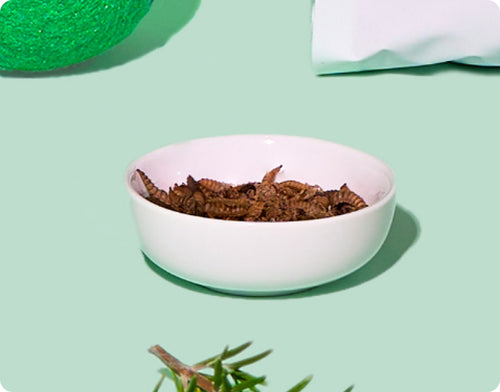
Made with single-source proteins
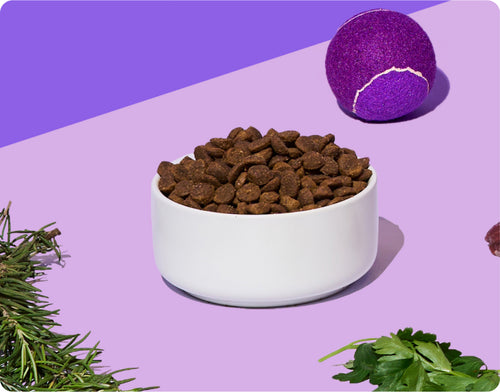
Free from dairy, wheat, soy, and corn.
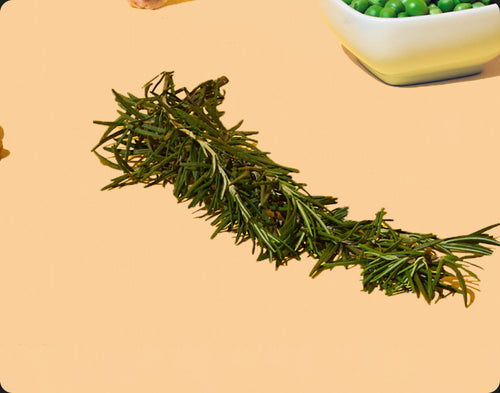
Low in additives and by-products.
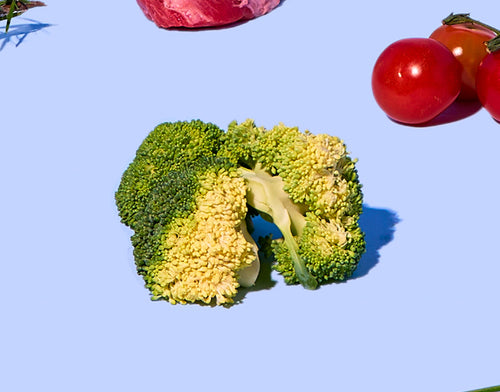
Food enriched with probiotics and fibre.
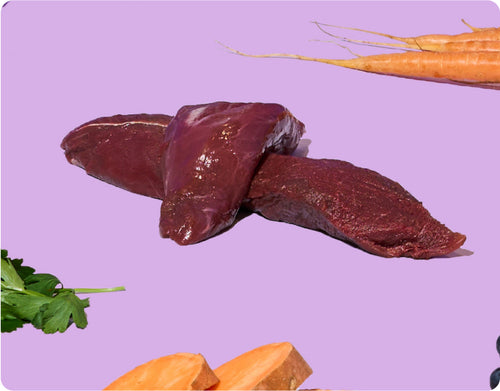
Labeled as “limited-ingredient” or “hypoallergenic”.

Look for formulas like “salmon and sweet potato”.
Foods to Avoid
Many well-meaning dog parents accidentally feed their Frenchies harmful foods. Avoid feeding your French Bulldog:

Chocolate
Contains theobromine, toxic to dogs

Grapes and raisins
Can cause kidney failure

Onions and garlic
Damage red blood cells
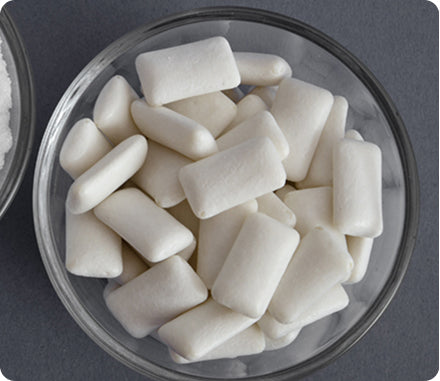
Xylitol
Can cause liver failure and insulin spikes
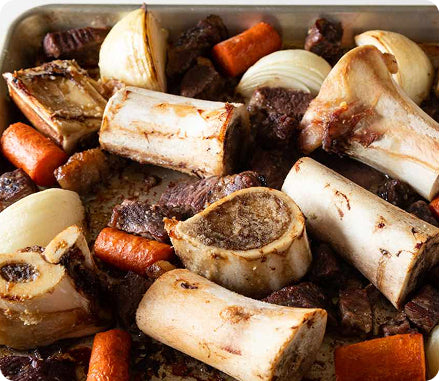
Cooked bones
Can splinter and cause internal damage

High-fat table scraps
May lead to pancreatitis
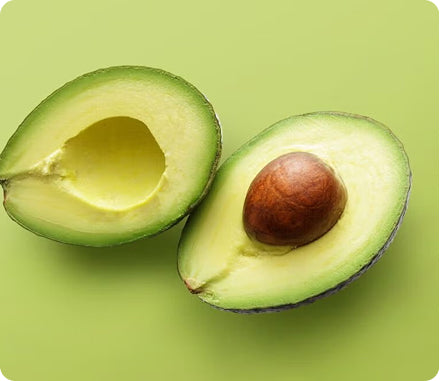
Avocado
Contains persin, mildly toxic to dogs
Even some commercial dog foods are problematic if they include:
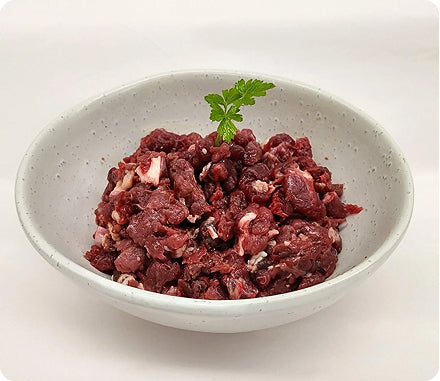
Meat by-products
Often includes low-grade parts with no clear protein source
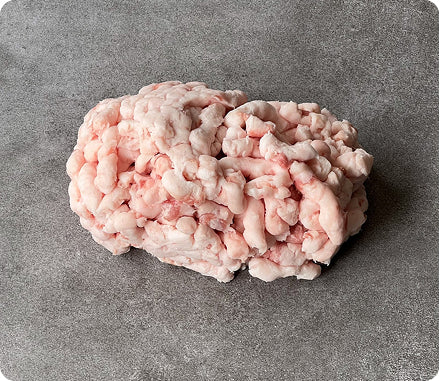
Unnamed "animal fat" or "meat meal"
Lack of transparency; can vary in quality
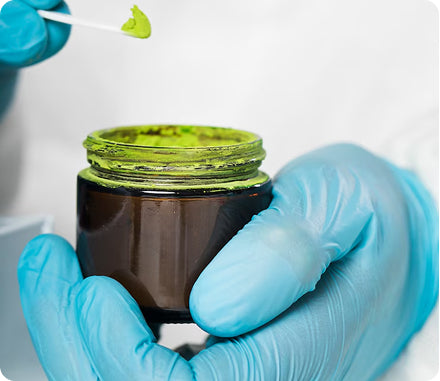
Artificial preservatives (BHA, BHT)
Protentially linked to health risks over time
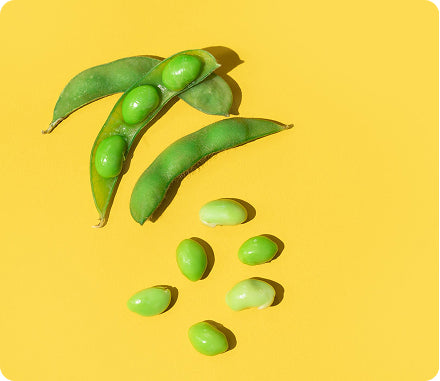
Cheap grains like corn, soy, or wheat
Common allergens; low in nutritional value
How to Prevent Obesity in French Bulldogs
Obesity is one of the most overlooked health threats to French Bulldogs. Their short legs and thick body structure don’t handle extra weight well—it puts pressure on their joints, worsens breathing, and increases the risk of heart problems.
Weight control starts with smart feeding habits.
Prevention tips:
- Stick to feeding guidelines based on weight and activity
- Avoid free-feeding or over-treating
- Use meals that offer complete nutrition in fewer calories
- Break food into two meals a day to support digestion
- Pair with daily low-impact exercise like short walks or indoor play
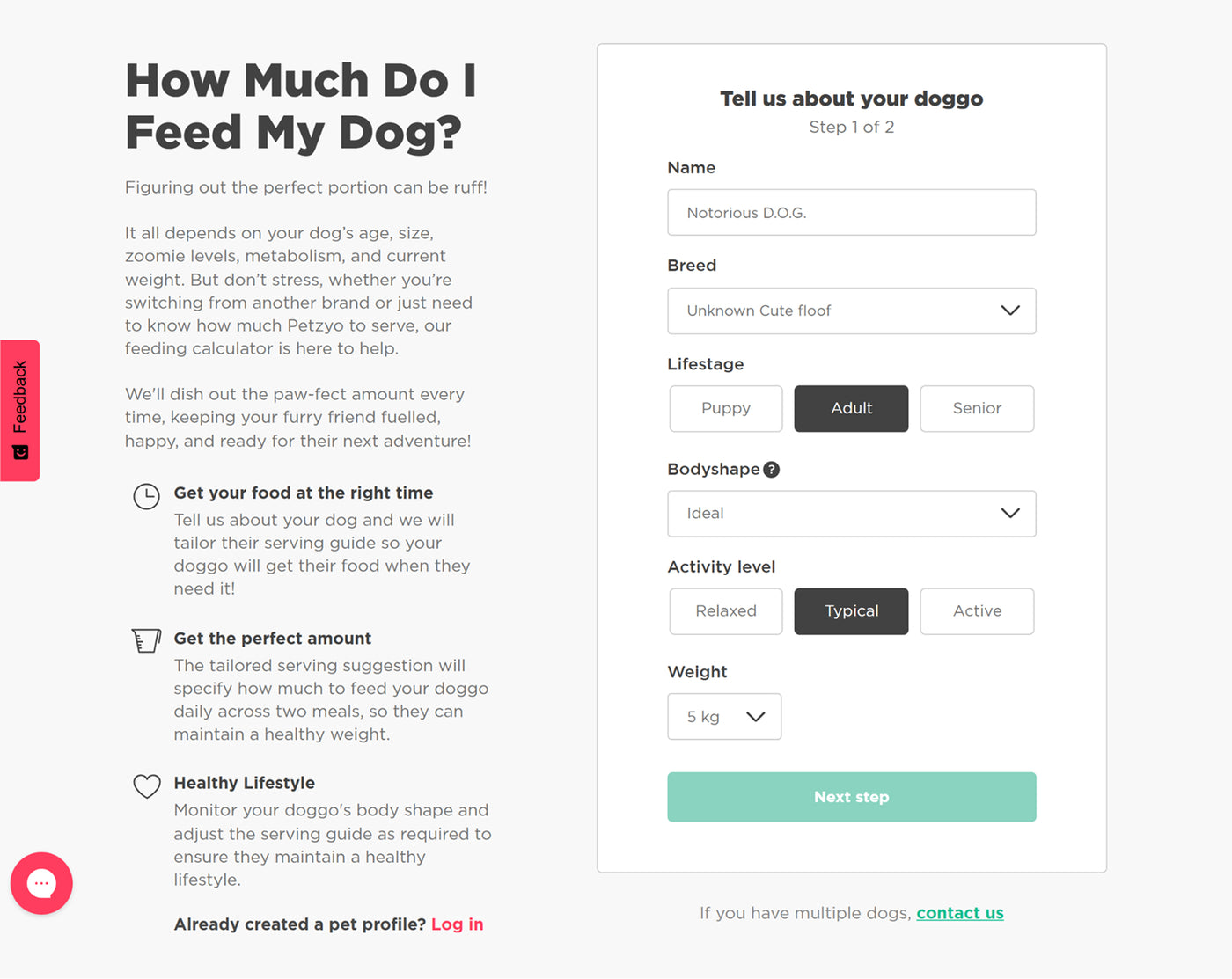
Remember: Healthy weight starts with a healthy gut. A properly formulated diet is your first and most powerful tool to prevent long-term health issues in French Bulldogs. That’s why we’ve made it our mission to create premium dog food that supports French Bulldogs from the inside out—because healthy food makes a happy Frenchie.
Shedding Amount
Drooling
Coat Grooming Needs
Trainability
Mental Stimulation Needs
French Bulldog Grooming & Maintenance
French Bulldogs might look like low-maintenance pets but proper grooming and care are still essential to prevent infections and skin problems. From their short coat to their iconic face wrinkles and unique tails, Frenchies require specific care that goes beyond a quick brush.
Do French Bulldogs Shed?
Yes, French Bulldogs do shed, but the amount is relatively low compared to long-haired breeds, especially during seasonal changes in spring and autumn.
- Shedding level: Low to moderate
- Brushing frequency: 1–2 times per week
- Tools to use: Soft-bristle brush or grooming mitt
Regular brushing also distributes natural oils, keeps their coat shiny, and helps you spot any skin issues early.

How to Clean French Bulldog Wrinkles (And Why You Must)
French Bulldogs’ adorable face wrinkles aren’t just for show—they’re a breeding ground for bacteria and yeast if not cleaned regularly.
Cleaning Routine:
- Gently wipe the wrinkles with a soft, damp cloth or a vet-approved wipe
- Dry wrinkles thoroughly with a clean, dry cloth
- Do this 2–3 times a week—or daily if your Frenchie has deep wrinkles
Important: Never leave wrinkles damp after cleaning. Moisture buildup is the #1 cause of wrinkle infections.
Training & Exercise Needs for French Bulldogs
When it comes to exercise and training, French Bulldogs require a unique approach. Their short snouts, compact bodies, and independent personalities make it essential to strike the right balance between mental stimulation, light physical activity, and consistent training.
How Much Exercise Do French Bulldogs Need?
French Bulldogs are not marathon runners. In fact, too much exercise can do more harm than good, especially during hot weather or intense play sessions. But that doesn’t mean they’re couch potatoes either.
Best Low-Intensity Exercises for French Bulldogs
The best activities for French Bulldogs are low-impact, controlled, and fun. Here are some Frenchie-friendly ideas:
- Leisurely leash walks (not jogs!)
- 30 to 45 minutes of total activity per day, split into short sessions
- Tug-of-war with a soft toy
- Gentle walks in cooler parts of the day
- Hide and seek with treats
- Food puzzle toys for mental stimulation
- Indoor obstacle courses (using cushions, boxes, or safe furniture)
- Swimming (only with supervision and a dog life vest—many Frenchies can’t swim naturally)
- Mental stimulation through toys, puzzles, or light training exercises
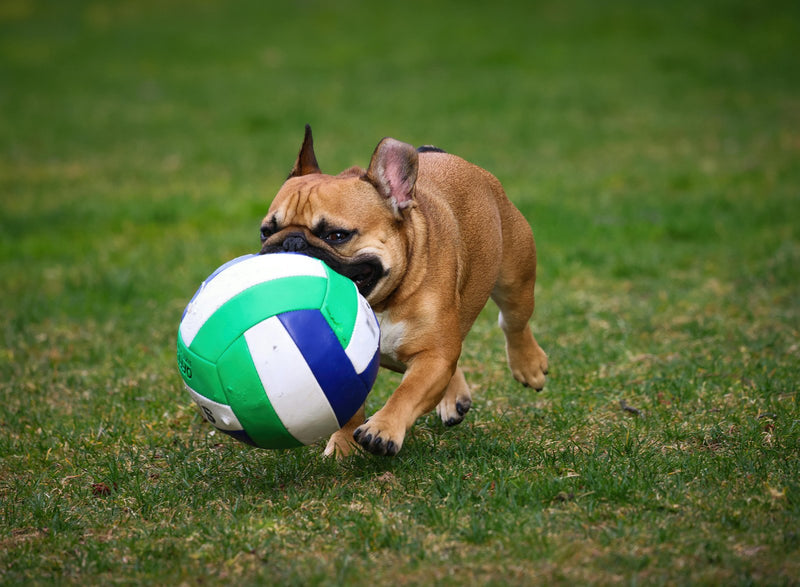
Are French Bulldogs Easy to Train?
It depends. French Bulldogs are intelligent—but also notoriously stubborn. This doesn’t mean they’re “bad” at training—it means they need the right approach: positive, consistent, and reward-based.
The trick is to make training fun, not frustrating. Keep sessions short (5–10 minutes), end on a win, and always have a high-value treat (like a piece of their favorite food) on hand.
How to Housebreak & Obedience Train a French Bulldog
Start training early and stick to a clear routine.
Housebreaking tips:
- Take them out after meals, naps, and play
- Use the same outdoor spot
- Reward immediately after success
- Crate training helps build bladder control
Obedience training tips:
- Start with basics: sit, stay, come, leave it
- Use hand signals and voice commands together
- Reward desired behavior with small treats or affection
- Avoid shouting or punishment
- End sessions with playtime to build positive associations
Training Mistakes to Avoid with French Bulldogs
Avoid these 7 mistakes:
- Yelling or punishment – causes fear and confusion
- No structure – creates anxiety and disobedience
- Skipping socialization – leads to reactivity
- Free-feeding – increases risk of obesity
- Leaving alone too long – triggers emotional distress
- No stimulation – results in destructive behavior
- Treating them like a toy – ignores their physical and emotional needs

Vet Bills
AUD $600 – $1,500 annually
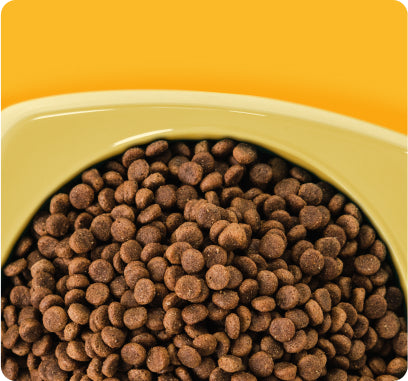
Food
AUD $80 – $150 monthly

Grooming & Hygiene
AUD $200 – $400 annually

Pet Insurance
AUD $60 – $100+ monthly
Cost & Ownership Considerations
French Bulldogs are one of the most sought-after dog breeds in the world, and their price tag reflects that. From the initial purchase to long-term care, owning a Frenchie is an emotional and financial commitment.
How Much Does a French Bulldog Cost?
French Bulldogs cost between AUD $4,000 and $15,000+, depending on breeder reputation, color, and bloodline. Yes, it’s one of the most expensive dog breeds to purchase, and there’s a good reason for that.
Why Are French Bulldogs So Expensive?
Unlike many breeds, French Bulldogs cannot reproduce naturally. Their narrow hips mean artificial insemination and C-section deliveries are often required—driving up breeder costs.
What you’re paying for includes:
- Specialized breeding techniques
- Genetic health testing
- Vet-assisted births
- High demand and limited supply
Factors That Affect French Bulldog Prices
- Breeder quality: Ethical breeders with health-certified parents and excellent lineage charge more (and rightfully so).
- Color & Coat: Rare colors like blue, lilac, and merle can add thousands to the price.
- Bloodline & Pedigree: Champion or show-quality bloodlines carry a premium price tag.
Ongoing Ownership Costs
French Bulldogs are a long-term financial commitment.
Vet Bills
Estimated Annual Vet Costs: AUD $600 – $1,500 (or more for dogs with chronic issues)
French Bulldogs are prone to respiratory issues, skin allergies, digestive problems, and joint concerns. Regular checkups, preventative surgery at 6-12 months of age, vaccinations, dental care, and potential emergency visits can add up fast.
Food
Estimated Monthly Food Cost: AUD $80 – $150 (depending on quality and portion size)
Frenchies need a high-quality, breed-appropriate diet to maintain healthy weight, skin, and digestion. Feeding cheap kibble may save money now but leads to vet bills later.
Grooming & Hygiene
Estimated Annual Grooming Cost: AUD $200 – $400 (if done at home, more with professional grooming)
While they’re low-maintenance compared to long-haired breeds, French Bulldogs still need:
- Regular wrinkle and tail pocket cleaning
- Nail trimming
- Occasional baths and ear cleaning
Pet Insurance
Expect to pay AUD $60 – $100+ per month, depending on coverage.
Frenchies are high-risk for breed-specific health conditions, which makes pet insurance not just worth it—but essential. Choose a plan that covers hereditary and congenital issues (many cheaper plans don’t).
Thinking Twice? Here Are 5 Reasons Not to Get a French Bulldog (Unless You’re Ready)
French Bulldogs are loyal, affectionate, and full of character—but they are not low-effort pets. While they’re incredibly rewarding companions, they’re not for everyone.
Here are 5 reasons to reconsider getting a French Bulldog if you're unsure about long-term commitment:
1. High Vet Needs: French Bulldogs are prone to numerous health issues, including:
- Brachycephalic Obstructive Airway Syndrome (BOAS), with many requiring corrective upper airway surgery at the age of 6-12 months.
- Snoring and snorting: Brachycephalic traits cause severe difficulties breathing, sleeping and exercising
- Heat sensitivity: French Bulldogs overheat easily, even in mild temperatures.
- Spinal problems: Some individuals have congenital spinal malformation causing curvature of the spine, pain and mobility issues.
- Digestive issues: Many French Bulldogs require special diets.
- Wrinkle care: Deep skin folds need regular cleaning to prevent infection.
- Low exercise tolerance: Overexertion can lead to breathing issues due to their brachycephalic structure (short and squashed skulls).
- Dystocia: High incidence of birthing difficulties requiring Caesarean section
2. Separation anxiety: French Bulldogs become distressed when left alone.
3. Stubborn behavior: Training takes patience and consistency.
4. Non-hypoallergenic: They shed and produce dander.
5. Emotional dependency: They may follow you everywhere and hate being alone.
Only choose a French Bulldog if you’re ready to meet these needs every day. And we’re here to support that journey, with food and education tailored to the real needs of your Frenchie.
